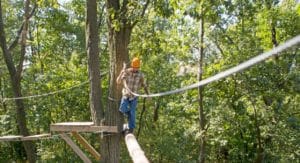 Outdoor ropes course is a form of experiential therapy tied to both Gestalt and cognitive therapies. It stresses the association between behavior and emotion, with a goal of replacing negative behaviors or thoughts with positive ones. Used as a complementary therapy, ropes helps facilitate personal growth and build coping skills. Ropes course is a type of adventure therapy, in which clients participate in rope activities in a safe, supervised environment. Many courses are set up on low platforms with a therapist/coach providing close instruction, therefore physical fitness is not a prerequisite. When high ropes are used, careful precautions and harnesses ensure the safety of participants. The group setting encourages cooperation and communication, while helping clients overcome personal challenges.
Outdoor ropes course is a form of experiential therapy tied to both Gestalt and cognitive therapies. It stresses the association between behavior and emotion, with a goal of replacing negative behaviors or thoughts with positive ones. Used as a complementary therapy, ropes helps facilitate personal growth and build coping skills. Ropes course is a type of adventure therapy, in which clients participate in rope activities in a safe, supervised environment. Many courses are set up on low platforms with a therapist/coach providing close instruction, therefore physical fitness is not a prerequisite. When high ropes are used, careful precautions and harnesses ensure the safety of participants. The group setting encourages cooperation and communication, while helping clients overcome personal challenges.
How Ropes Course Helps
Ropes courses help clients struggling with anxiety, addiction and other mental health challenges. Some aspects of the ropes course require teamwork, which can lead to building trust in others and interpersonal growth. By mastering the course, clients experience a boost in confidence. This can help them overcome fears and complete challenges they never thought possible. The knowledge gained from this experience can promote new coping skills and facilitate healthier behaviors and relationships moving forward.
Benefits of Ropes Courses
Participating in a ropes course delivers many benefits. Working together enables clients to achieve new goals, which translates to other areas of their lives. Clients learn skills involving cooperation, problem-solving, goal-setting and strategic risk-taking. Studies show ropes courses help reduce anxiety on a short- and long-term basis. Benefits include:
- Overcoming fears
- Expanding one’s comfort zone
- Surrendering and accepting feelings
- Greater self-awareness
- Higher self-confidence
- Improved self-trust and leadership
- Increased trust in others
- Increased positive life outlook
- Improved problem-solving and coping skills
